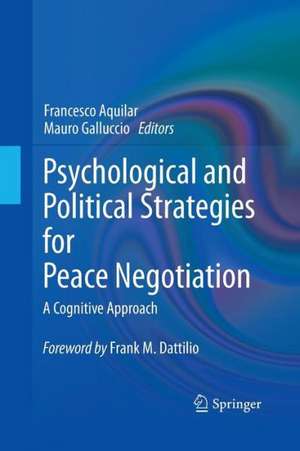Psychological and Political Strategies for Peace Negotiation: A Cognitive Approach
Editat de Francesco Aquilar, Mauro Galluccioen Limba Engleză Paperback – 7 oct 2014
Psychological and Political Strategies for Peace Negotiation gathers the foremost authors in the field and combines their expertise into a volume which addresses the complexity of peace negotiation strategies. To further underscore the importance of successful negotiation strategies, the editors have also included the unique perspective of authors with personal experience with political upheaval in Serbia and Lebanon. Though each chapter focuses on a different topic, they are integrated to create a foundation for future research and practice.
Specific topics included in this volume embrace:
• Changing minds and the multiple intelligence (MI) framework
• Personal schemas in the negotiation process
• Escalation of image in international conflicts
• Representative decision making
• Transformative leadership for peace negotiation
Psychological and Political Strategies for Peace Negotiation is an essential reference for psychologists, negotiators, mediators, and conflict managers, as well as for students and researchers in international, cross-cultural and peace psychology studies.
| Toate formatele și edițiile | Preț | Express |
|---|---|---|
| Paperback (1) | 640.06 lei 6-8 săpt. | |
| Springer – 7 oct 2014 | 640.06 lei 6-8 săpt. | |
| Hardback (1) | 646.30 lei 6-8 săpt. | |
| Springer – 25 noi 2010 | 646.30 lei 6-8 săpt. |
Preț: 640.06 lei
Preț vechi: 753.01 lei
-15% Nou
Puncte Express: 960
Preț estimativ în valută:
122.51€ • 133.12$ • 102.98£
122.51€ • 133.12$ • 102.98£
Carte tipărită la comandă
Livrare economică 21 aprilie-05 mai
Preluare comenzi: 021 569.72.76
Specificații
ISBN-13: 9781489981523
ISBN-10: 1489981527
Pagini: 288
Ilustrații: XXVIII, 258 p.
Dimensiuni: 155 x 235 x 15 mm
Greutate: 0.41 kg
Ediția:2011
Editura: Springer
Colecția Springer
Locul publicării:New York, NY, United States
ISBN-10: 1489981527
Pagini: 288
Ilustrații: XXVIII, 258 p.
Dimensiuni: 155 x 235 x 15 mm
Greutate: 0.41 kg
Ediția:2011
Editura: Springer
Colecția Springer
Locul publicării:New York, NY, United States
Public țintă
ResearchCuprins
Dedication.- Foreword.- Preface.- Acknowledgments.- About the Editors.- Contributors.- How the Application of the Multiple Intelligences (MI) Framework could Positively Contribute to the Theory and Practice of International Negotiation.- International Negotiations, Evolution and the Value of Compassion.- Personal Schemas in the Negotiation Process: A Cognitive Therapy Approach.- Emotional Competence and Effective Negotiation: The Integration of Emotion Understanding, Regulation, and Communication.- Tacit Knowledge Structures in the Negotiation Process.- Ways to Improve Political Decision-Making: Negotiating Errors to be Avoided.- Escalation of Images in International Conflicts.- Communication Preliminary to Negotiation in Intractable Conflict.- Negotiating a New Deal between Science and Society: Reflections on the Importance of Cognition and Emotions in International Scientific Cooperation and Possible Implications for Enabling Sustainable Societies.- Representative Decision Making: Constituency Constraints on Collective Action.- Ideal Negotiator: A Personal Formula for the New International System.- How it Looks When Negotiations Fail: Why do We Need Specific and Specialized Training for International Negotiators?.- Cognitive Therapy in National Conflict Resolution: An Opportunity. The Lebanese Experience Transformative Leadership for Peace Negotiation.- Social Cognitive Psychotherapy: From Clinical Practice to Peace Perspectives.- Conclusions.
Recenzii
"This 16-chapter edited volume should be required reading for all negotiators, educators, researchers, and activists concerned for “peace negotiation” and related topics (e.g., national and international conflict resolution, interpersonal and marital conflicts). I offer this ringing endorsement because the editors of Psychological and Political Strategies for Peace Negotiation: A Cognitive Approach, Francesco Aquilar and Mauro Galluccio, have assembled a sterling group of contributors who address a broad spectrum of topics that encompass psychological, social, and political considerations in political negotiation.
The chapter contributors come from numerous countries (e.g., Canada, France, Germany, Lebanon, Russia, Serbia, Scotland, Turkey), and they represent a number of different specialty areas (e.g., biological ecology, clinical psychology, international relations, political science, psychiatry, sociology). All are published specialists in peace negotiation and conflict resolution.
In today’s global era our lives have become increasingly interdependent. Events in distant lands now often have immediate and profound implications for everyone. We are, indeed, the fabled “global village” that Marshall McLuhan (1962) wrote about almost a half-century ago. One outcome of our global era is that conflicts—ranging from minor disputes to chronic intractable military violence and wars among nations and different ethnopolitical groups—place all of our lives and well-being in jeopardy. The tightly woven web of international relations leaves little latitude for escape from a host of destructive consequences. Efforts must be made to address these conflicts in substantive and meaningful ways, and the current volume goes a long way toward meeting this goal because of both its breadth and substance.
I found each chapter to broaden my thinking about the many nuances andcomplexities of peace and conflict resolution. From the opening chapter by Howard Gardner (multiple intelligences) to the closing chapter by Francesco Aquilar (use of social cognitive therapy from individuals to nations), the reader is treated to a range of conceptual models, empirical research, intervention strategies, and informed opinions on the changes needed to improve peace negotiations.
Imagine a volume on peace negotiation that gives rich discussion on so many issues: emotion, communication, and compassion (e.g., Paul Gilbert, Carolyn Saarni); going beyond reliance on conventional appeals to logic (e.g., Robert Leahy); tacit knowledge (Thomas Dowd and Angela Roberts Miller); escalation images (e.g., Guy Faure); pre-encounter communication (e.g., Dean Pruitt); limits of science and sustainability (e.g., Cornelia Nauen); constraints and limitations from constituents (e.g., Druckman, Çuhadar, Beriker, and Celik); and the need for special training of peace negotiators (e.g., Olivera Zikic). The chapter by Meichenbaum summarizes a score of thinking errors that often occur in negotiation (e.g., stereotypes, seeking consistency, attribution errors); the chapter by Karam on Lebanon offers one of the best analyses of an actual peace negotiation that I have read; and the chapters by Galluccio and by Kremenyuk offer inspiring visions for the future for peace negotiation and world peace.
I do, however, have a few suggestions. As a cultural psychologist I would suggest more explicit attention be given to ethnocultural considerations. I say “explicit” because many of the chapters are sensitive to the ethnocultural differences of the negotiating parties, and they address these differences via discussions of emotion, compassion, histories, thinking styles, and so forth. However, I am speaking here about the possibility of focusing specifically on the topic of ethnopolitical considerations via discussions of alternative culturalconstructions of reality (e.g., Avruch & Vejarano, 2002; Marsella, 2005, 2007).
Ethnocultural differences have always been a bane in conflict negotiation. For example, in discussing the example of truth and reconciliation processes, Avruch and Vejarano (2001, 2002), wrote:
Most of the truth and truth and reconciliation commissions covered in the literature have worked (when they do) in Christian countries, and have recourse to broadly (if not perfectly) shared Christian values. But any attention to culture should alert us to the recognition that such notions as justice, truth, forgiveness, reconciliation, and accountability—to name a few—are always socially constructed and culturally constituted. Research in conflict resolution has already established different modalities for Islamic and “Western” cultures around such key ideas as justice, peace, and reconciliation—and contrition and forgiveness—and there is no reason to think that cultural differences stop there. (Avruch & Vejarano, 2002, p. 43)
In my work on ethnocultural considerations, I have noted that there are profound differences across ethnocultural groups in the perception, processing, and storage of information about the world across verbal, imagistic, emotional, proprioceptive, visceral, and total body modalities. What is important here is that, too often, Western approaches to reality construction emphasize the verbal/rational linear thinking approach.
Consider our many and varied psychotherapies: They depend heavily upon verbalization—using words to communicate complex ideas, feelings, and memories. However, many groups do not code reality in the verbal mode. As a result, the use of verbal channels to change behavior may be limited.
I can recall a failed therapy occasion with a Filipino plantation worker in Hawaii who thanked me for my efforts after a number of counseling sessions. Hesaid, “Thank you, doctor, you are a good person, but I still don’t feel good.” He did not feel good because I failed to access the many channels of his codification of experience and the rich and detailed material that was there and that needed to be addressed via other methods beyond talking.
He was, as all of us are, a whole person—body, mind, and spirit. I had to learn from this case that I had failed to tap all the modes (i.e., image, emotion, proprioceptive, visceral) in which his experience had been encoded and was being experienced as part of his adjustment. The power of accessing all modes of experience among different ethnocultural groups cannot be ignored or dismissed in something as critical as peace negotiations.
I wish to commend the editors and authors of Psychological and Political Strategies for Peace Negotiation: A Cognitive Approach for an exceptional effort that does much to advance the area of peace negotiation and conflict resolution. I recommend this volume heartily as a definite advance in our knowledge and a definite contribution to peace and justice: not to be missed."
- Anthony J. Marsella, PsycCRITIQUES, August 24, 2011, Vol. 56, No. 34, Article 8
The chapter contributors come from numerous countries (e.g., Canada, France, Germany, Lebanon, Russia, Serbia, Scotland, Turkey), and they represent a number of different specialty areas (e.g., biological ecology, clinical psychology, international relations, political science, psychiatry, sociology). All are published specialists in peace negotiation and conflict resolution.
In today’s global era our lives have become increasingly interdependent. Events in distant lands now often have immediate and profound implications for everyone. We are, indeed, the fabled “global village” that Marshall McLuhan (1962) wrote about almost a half-century ago. One outcome of our global era is that conflicts—ranging from minor disputes to chronic intractable military violence and wars among nations and different ethnopolitical groups—place all of our lives and well-being in jeopardy. The tightly woven web of international relations leaves little latitude for escape from a host of destructive consequences. Efforts must be made to address these conflicts in substantive and meaningful ways, and the current volume goes a long way toward meeting this goal because of both its breadth and substance.
I found each chapter to broaden my thinking about the many nuances andcomplexities of peace and conflict resolution. From the opening chapter by Howard Gardner (multiple intelligences) to the closing chapter by Francesco Aquilar (use of social cognitive therapy from individuals to nations), the reader is treated to a range of conceptual models, empirical research, intervention strategies, and informed opinions on the changes needed to improve peace negotiations.
Imagine a volume on peace negotiation that gives rich discussion on so many issues: emotion, communication, and compassion (e.g., Paul Gilbert, Carolyn Saarni); going beyond reliance on conventional appeals to logic (e.g., Robert Leahy); tacit knowledge (Thomas Dowd and Angela Roberts Miller); escalation images (e.g., Guy Faure); pre-encounter communication (e.g., Dean Pruitt); limits of science and sustainability (e.g., Cornelia Nauen); constraints and limitations from constituents (e.g., Druckman, Çuhadar, Beriker, and Celik); and the need for special training of peace negotiators (e.g., Olivera Zikic). The chapter by Meichenbaum summarizes a score of thinking errors that often occur in negotiation (e.g., stereotypes, seeking consistency, attribution errors); the chapter by Karam on Lebanon offers one of the best analyses of an actual peace negotiation that I have read; and the chapters by Galluccio and by Kremenyuk offer inspiring visions for the future for peace negotiation and world peace.
I do, however, have a few suggestions. As a cultural psychologist I would suggest more explicit attention be given to ethnocultural considerations. I say “explicit” because many of the chapters are sensitive to the ethnocultural differences of the negotiating parties, and they address these differences via discussions of emotion, compassion, histories, thinking styles, and so forth. However, I am speaking here about the possibility of focusing specifically on the topic of ethnopolitical considerations via discussions of alternative culturalconstructions of reality (e.g., Avruch & Vejarano, 2002; Marsella, 2005, 2007).
Ethnocultural differences have always been a bane in conflict negotiation. For example, in discussing the example of truth and reconciliation processes, Avruch and Vejarano (2001, 2002), wrote:
Most of the truth and truth and reconciliation commissions covered in the literature have worked (when they do) in Christian countries, and have recourse to broadly (if not perfectly) shared Christian values. But any attention to culture should alert us to the recognition that such notions as justice, truth, forgiveness, reconciliation, and accountability—to name a few—are always socially constructed and culturally constituted. Research in conflict resolution has already established different modalities for Islamic and “Western” cultures around such key ideas as justice, peace, and reconciliation—and contrition and forgiveness—and there is no reason to think that cultural differences stop there. (Avruch & Vejarano, 2002, p. 43)
In my work on ethnocultural considerations, I have noted that there are profound differences across ethnocultural groups in the perception, processing, and storage of information about the world across verbal, imagistic, emotional, proprioceptive, visceral, and total body modalities. What is important here is that, too often, Western approaches to reality construction emphasize the verbal/rational linear thinking approach.
Consider our many and varied psychotherapies: They depend heavily upon verbalization—using words to communicate complex ideas, feelings, and memories. However, many groups do not code reality in the verbal mode. As a result, the use of verbal channels to change behavior may be limited.
I can recall a failed therapy occasion with a Filipino plantation worker in Hawaii who thanked me for my efforts after a number of counseling sessions. Hesaid, “Thank you, doctor, you are a good person, but I still don’t feel good.” He did not feel good because I failed to access the many channels of his codification of experience and the rich and detailed material that was there and that needed to be addressed via other methods beyond talking.
He was, as all of us are, a whole person—body, mind, and spirit. I had to learn from this case that I had failed to tap all the modes (i.e., image, emotion, proprioceptive, visceral) in which his experience had been encoded and was being experienced as part of his adjustment. The power of accessing all modes of experience among different ethnocultural groups cannot be ignored or dismissed in something as critical as peace negotiations.
I wish to commend the editors and authors of Psychological and Political Strategies for Peace Negotiation: A Cognitive Approach for an exceptional effort that does much to advance the area of peace negotiation and conflict resolution. I recommend this volume heartily as a definite advance in our knowledge and a definite contribution to peace and justice: not to be missed."
- Anthony J. Marsella, PsycCRITIQUES, August 24, 2011, Vol. 56, No. 34, Article 8
Notă biografică
Francesco Aquilar received his “Dottore in Psicologia” degree from the University of Rome, Italy. He is a psychologist and a cognitive-behavioral psychotherapist in private practice in Naples, Italy. Dr. Aquilar is the President of the Italian Association for Social and Cognitive Psychotherapy (AIPCOS), and Supervisor of the Italian Society for Behavioral and Cognitive Therapy (SITCC). Since more than 15 years he is a member of the Governing Body of the European Association for Behavioral and Cognitive Therapies (EABCT). He has more than 60 professional publications in the areas of anxiety disorders, eating disorders, marital and family discord, social psychology, interpersonal negotiations, and has also given numerous international presentations on the cognitive-behavioural treatment of psychological problems and couple distress. Among his many publications, Dr. Aquilar is author of Test psicologici e pubblicità (Psychological testing and advertising, Rome 1982), Riconoscere le emozioni (Identifying emotions, Milan 2000), Psicoterapia dell’amore e del sesso (Psychotherapy for love and sex problems, Milan 2006a), Le donne dalla A alla Z (Women from A to Z, Milan 2006b); he is editor or coeditor of La coppia in crisi: istruzioni per l’uso (Couples in crisis: operating instructions, with S. Ferrante, Assisi 1994), La coppia in crescita (Couples in growth, Assisi 1996), Psicoterapia delle fobie e del panico (Psychotherapy for phobias and panic, with E. Del Castello, Milan 1998), Psicoterapia dell’anoressia e della bulimia (Psychotherapy for anorexia and bulimia, with E. Del Castello and R. Esposito, Milan 2005). He is coauthor of Psychological processes in international negotiations: theoretical and practical perspectives (with M.Galluccio, New York, 2008).
Mauro Galluccio received his PhD in Political Science from the Free University of Brussels, Belgium. He is the President of the European Association for Negotiation and Mediation(EANAM), based in Brussels. Dr. Galluccio studied for a long time in Italy and has a degree in both political sciences and psychological sciences and techniques for the persons and the community. He has given many speeches, presented numerous papers and symposia at international conferences and congresses on the subject of International Relations, with a particular interest in the application of cognitive-behavioral psychotherapy principles to the field of political sciences. As lecturer on behalf of the Directorate-General Communication of the European Commission he gives conferences to many International Universities, enterprises, and national administrations from different Countries. Dr. Galluccio has worked within the European institutional framework as political analyst and adviser. He was political coordinator at the Directorate-General of the European Commission for Development and Relations with African, Caribbean and Pacific States. Previously he was Spokesman to the President of COPA and coordinator of the Crisis Management Unit at the COPA-COGECA. Among Dr. Galluccio’s research interests are those on applied cognitive psychology and psychotherapy; interpersonal negotiations; specific training for negotiators and politicians; preventive diplomacy and conflict resolution; Common Foreign and Security Policy for the European Union; the European Union internal negotiation processes and institutional external communication. He is coauthor of Psychological processes in international negotiations: theoretical and practical perspectives (with F. Aquilar, New York, 2008).
Mauro Galluccio received his PhD in Political Science from the Free University of Brussels, Belgium. He is the President of the European Association for Negotiation and Mediation(EANAM), based in Brussels. Dr. Galluccio studied for a long time in Italy and has a degree in both political sciences and psychological sciences and techniques for the persons and the community. He has given many speeches, presented numerous papers and symposia at international conferences and congresses on the subject of International Relations, with a particular interest in the application of cognitive-behavioral psychotherapy principles to the field of political sciences. As lecturer on behalf of the Directorate-General Communication of the European Commission he gives conferences to many International Universities, enterprises, and national administrations from different Countries. Dr. Galluccio has worked within the European institutional framework as political analyst and adviser. He was political coordinator at the Directorate-General of the European Commission for Development and Relations with African, Caribbean and Pacific States. Previously he was Spokesman to the President of COPA and coordinator of the Crisis Management Unit at the COPA-COGECA. Among Dr. Galluccio’s research interests are those on applied cognitive psychology and psychotherapy; interpersonal negotiations; specific training for negotiators and politicians; preventive diplomacy and conflict resolution; Common Foreign and Security Policy for the European Union; the European Union internal negotiation processes and institutional external communication. He is coauthor of Psychological processes in international negotiations: theoretical and practical perspectives (with F. Aquilar, New York, 2008).
Textul de pe ultima copertă
Peace is one of the most sought after commodities around the world, and as a result, individuals and countries employ a variety of tactics to obtain it. One of the most common practices used to accomplish peace is negotiation. With its elevated role in the dialogue surrounding peace, negotiation is often steeped in politics and focused on managing parties in conflict. However, the art and science of negotiation can and should be viewed more broadly to include a psychological and cognitive approach.Psychological and Political Strategies for Peace Negotiation gathers the foremost authors in the field and combines their expertise into a volume which addresses the complexity of peace negotiation strategies. To further underscore the importance of successful negotiation strategies, the editors have also included the unique perspective of authors with personal experience with political upheaval in Serbia and Lebanon. Though each chapter focuses on a different topic, they are integrated to create a foundation for future research and practice.Specific topics included in this volume embrace:• Changing minds and the multiple intelligence (MI) framework• Personal schemas in the negotiation process• Escalation of image in international conflicts• Representative decision making• Transformative leadership for peace negotiationPsychological and Political Strategies for Peace Negotiation is an essential reference for psychologists, negotiators, mediators, and conflict managers, as well as for students and researchers in international, cross-cultural and peace psychology studies.
Caracteristici
Provides a unique application of cognitive behavioral principles to a negotiation setting Contributors are internationally recognized experts Offers guidelines for decision making Uses a compassion-oriented perspective Discusses training issues Includes supplementary material: sn.pub/extras











